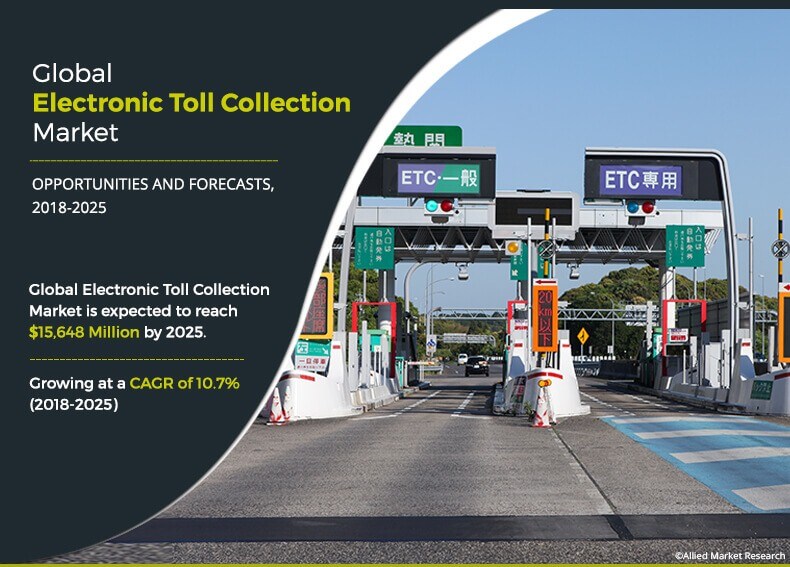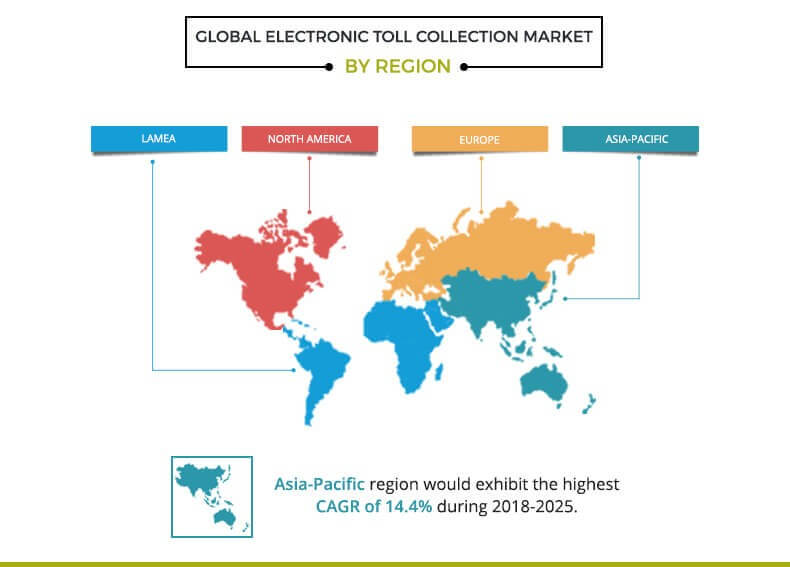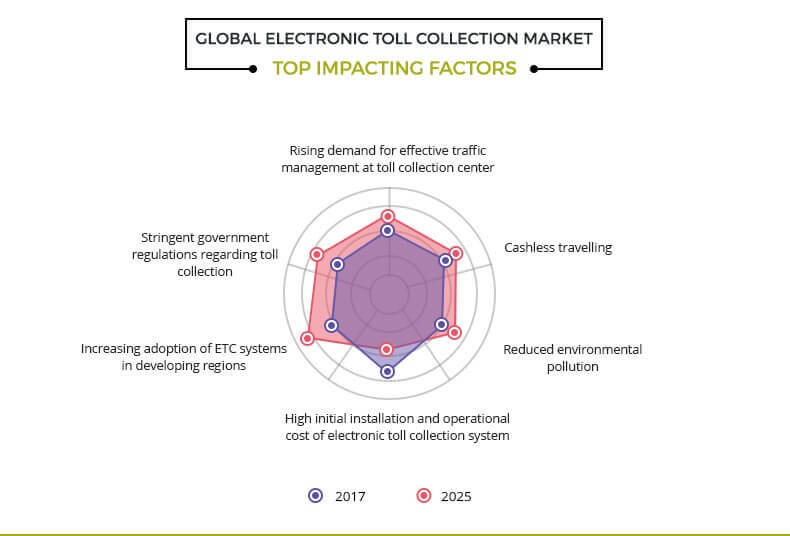Electronic Toll Collection Market Outlook - 2025
Electronic Toll Collection Market size was valued at $6,855.5 million in 2017, and is projected to reach at $15,648.2 million by 2025, growing at a CAGR of 10.7% from 2018 to 2025. Electronic toll collection (ETC) system is a high-end technology, which is meant for automatic toll collection without requiring the driver to stop. It uses latest technological solutions, such as DSRC, GPS & GNSS toll collection and tracking solutions, and video analytics to efficiently manage traffic in highly congested areas, thereby easing the toll collection process.
The growth of the global electronic toll collection market is driven by upsurge in demand for safety and efficiency of transportation infrastructure. Moreover, technological advancements in this industry, such as GNSS and GPS technology adopted by Japan in their electronic toll collection systems, have enforced governments across the globe to make heavy investments on toll lanes, which fuel the electronic toll collection market growth. Furthermore, government support in framing new standards and regulations regarding the implementation of these systems and tolling has propelled the industry growth.
Electronic toll collection system serves as an economical alternative to a staffed booth, as it reduces transactional costs for government agencies. For instance, in February 2017, intelligent highway toll collection technology was developed for Taiwan, offering potential for export across Europe and Asia. Far Eastern Electronic Toll Collection Company (FETC) achieved the build operate transfer (BOT) project for ITS traffic management; it turns the traditional highway toll collection system into an integrated intelligent electronic toll collection (ETC) system for mobility management. With approximately 1.5 million daily vehicle trips and an average saving of 15 minutes/vehicle trip, the total savings of traffic time is estimated at 22.5 million minutes daily and carbon savings of 572,000 tons of CO2.
The electronic toll collection (ETC) market has witnessed substantial growth in recent years, driven by increase in need for efficient & seamless toll collection systems. ETC systems utilize advanced technologies, such as radio frequency identification (RFID) and dedicated short-range communication (DSRC), to enable automatic toll collection without the need for manual transactions.
The ETC market is experiencing several notable trends. The adoption of cashless tolling systems is increasing, as they offer convenience, reduce traffic congestion, and enhance overall road safety. The integration of ETC systems with vehicle telematics and navigation systems is simultaneously gaining traction, providing users with real-time traffic information and route optimization. Moreover, the emergence of interoperable ETC systems allows drivers to use a single transponder or account for multiple toll roads & bridges, simplifying the tolling experience.
Further, governments and transportation authorities across the globe are recognizing the benefits of ETC systems, such as improved traffic flow, reduced fuel consumption, and lower emissions. which raises the need to modernize existing toll infrastructure and increase operational efficiency, thereby fueling the demand for ETC solutions. Furthermore, advancements in technology, including the use of mobile-based applications, are enhancing the capabilities and user experience of ETC systems.
However, high initial cost incurred in the installation along with significant operating & maintenance costs hinders the growth of the market. In addition, lack of standardization in toll collection systems and high dependency on government for approvals for electronic toll collection act as significant threats to the market growth.
On the contrary, increase in adoption of electronic toll collection systems in the developing regions and implementation of stringent government regulations toward installing electronic toll collection are anticipated to offer lucrative opportunities for market expansion.
Major players operating in the global electronic toll collection market are Kapsch Group, Thales Group, Toshiba Corporation, Raytheon, Conduent LLC, Siemens AG, TransCore LP, Cubic Transportation, Perceptics LLC, and EFKON GmbH.
Segmentation
The electronic toll collection market is segmented based on subsystem, technology, application, and region. Automated vehicle identification, automated vehicle classification and violation enforcement system and transaction processing are studied under the subsystem segment. On the basis of technology, the market is categorized into RFID, dedicated short-range communication, infrared, GNSS/GPS, and video analytics. Depending on application, it is segregated into urban and highways. Region wise, it is analyzed across North America, Europe, Asia-Pacific, and LAMEA.
The ETC market is expected to continue its upward trajectory in the coming years. The adoption of ETC systems is increasing across regions, with Asia-Pacific anticipated to grow at a significant rate due to rapid urbanization, extensive road networks, and government initiatives to improve transportation infrastructure. Further, North America and Europe are significant contributors to the market growth, driven by the presence of well-established toll road networks and the focus on congestion management.
The need for efficient tolling systems and the benefits they offer in terms of traffic management & environmental sustainability drive the ETC market growth. As governments across the globe continue to invest in transportation infrastructure, the demand for ETC systems is expected to rise. Manufacturers and service providers should focus on developing interoperable and user-friendly ETC solutions to cater to the evolving needs of customers. With advancements in technology and supportive government initiatives, the ETC market presents substantial opportunities for growth and innovation, improving the overall efficiency of tolling operations and enhancing the public commuting experience.
Top Impacting Factors
Surge in demand for effective traffic management at toll collection center, increase in facilities of cashless travelling, high initial installation & operational cost of ETC, and increase in adoption of ETC in the developing regions are the significant factors that affect the growth of the global electronic toll collection market. These factors are anticipated to either drive or hamper the market growth.
Increase in Demand for Effective Traffic Management at Toll Collection Centers
Proper and effective traffic management ensures smooth traffic flow and saves time at the toll booth. Burgeoning traffic on national highways adds to additional congestion at toll plazas, which results in loss of time and fuel. The emerging electronic toll collection system uses technologies such as RFID with an on-board unit called tag to make toll payments directly from its linked prepaid or postpaid account. Furthermore, this system offers convenience to seamlessly pass through toll centers for payment, reducing traffic congestions. Thus, all these factors together propel the growth of the market.
High Initial Installation & Operational Cost of ETC
Electronic toll collection system is the most complex and latest means of collecting tolls. Although it has been in use for more than 20 years, the developments in ETC continue to exacerbate. The cost of implementing an ETC system varies widely depending on the scope of the project, making it difficult and expensive. In addition, the cost factor is impacted by whether the system is new or upgraded. Changes in the price range occur due the level of customized software required for business rules, back office operation, project location, and necessary signage. Such fluctuation in costs act as a major barrier for the electronic toll collection market.
Surge in Adoption of ETC in the Developing Regions
The global electronic toll collection system market is expected to show significant growth during the forecast period due to increase in demand for these systems in the developing economies such as India, China, and others. In addition, growth in urbanization and surge in population in these countries are anticipated to provide lucrative opportunities for market expansion. In addition, technological advancements, such as real-time tracking & monitoring of vehicles through GPS/GNSS, and adoption of RFID sensors in the developing regions such as Japan, China, and India play a major role in the development of the electronic toll collection market.
Key Benefits for Electronic Toll Collection Market :
- This study comprises an analytical depiction of the global electronic toll collection market along with the current trends and future estimations to portray the imminent investment pockets.
- The overall market potential is determined to understand the lucrative trends to gain a stronger foothold in the industry.
- The report includes information on key drivers, restraints, and opportunities with a detailed impact analysis.
- The electronic toll collection market is quantitatively analyzed from 2017 to 2025 to highlight the financial competency.
- Porter’s five forces analysis illustrates the potency of the buyers and suppliers in the global electronic toll collection market.
Electronic Toll Collection Market Report Highlights
| Aspects | Details |
| By Sub System Type |
|
| By Technology |
|
| By Application |
|
| By Region |
|
| Key Market Players | THALES, KAPSCH, CONDUENT (XEROX CORPORATION), RAYTHEON, CUBIC TRANSPORTATION, SIEMENS AG, TOSHIBA CORPORATION, TRANSCORE (ROPER TECHNOLOGIES), EFKON GMBH, PERCEPTICS |
Analyst Review
An electronic toll collection (ETC) system enables electronically charging a toll to an established customer account through real-time tracking and monitoring system. It allows vehicles to pass through a toll without requiring to stop at the toll center. The global electronic toll collection market is expanding rapidly to cater to the growing demands of safety and efficiency of transportation infrastructure. Technological advancements in this industry and increase in government investments on toll lanes drive the growth of the market.
The global market is expected to witness considerable growth due to high adoption of ETC systems globally. The market growth in North America is driven by increase in production of automobiles. Moreover, higher penetration of passenger cars in this region, owing to development of road infrastructure, propels the market growth. In addition, the federal government is investing heavily for infrastructural development; for instance, since 2000, investors have funded toll projects worth $36 billion in Colorado, Florida, Texas, and Virginia. Furthermore, highways are being upgraded with all electronic toll systems in the developing regions such as Asia-Pacific and LAMEA, providing better service plazas.
Kapsch Group, Thales Group, Toshiba Corporation, Raytheon, Conduent LLC, Siemens AG, TransCore LP, Cubic Transportation, Perceptics LLC, and EFKON GmbH are the key players that garner significant share in the global electronic toll collection market.
The electronic toll collection market is expected to boost in near future owing to the social distancing measures and contactless fee collection which trending in the market presently to slowdown the spread of the virus.
Loading Table Of Content...





